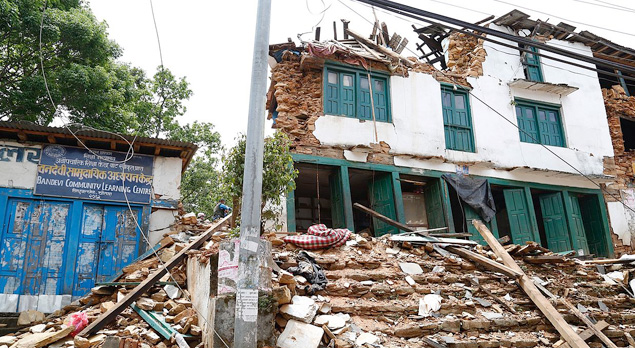Nepal Earthquake Update

Recently we heard from one of our Covent Garden customers who was in Nepal at the time of the earthquake. Mark Williams was above Thame when the tragic events of 26th April changed this beautiful country forever, he stayed for some days to help with the relief effort and we took the opportunity to ask a few questions so we could get a better understanding of the situation…
How did you end up in Nepal and where were you when the earthquake hit?
I was a few days in the "Three Passes" trek starting from Lukla. I was in the upper Thame valley at a little place called Maralung when the quake hit, about an hour short of our destination for that day, Lumde. We were then planning to cross the Renjo La pass to Gokyo. As it happened we had just stopped at a little teahouse for a snack when the shaking started.
Fortunately I had already changed my trousers in the rear part of the building because that part promptly collapsed. Luckily nobody in our group or our hosts was hurt. Lumde is beyond normal communications reach so it was a couple of days before we got down to Thame, realised the scale of the quake and were able to communicate with my family who by that time were getting very worried.
We hear there was a lack of supplies, etc. How did the Nepalese people react to this and to the relief effort?
Thame was completely destroyed and nothing arrived for about 4 days. The sherpas are extremely resilient, resourceful and independent people and by the time I arrived in Thame on the 27th April they had done what they could and were all living outside their homes in tents (the lucky ones) or under plastic or tarpaulins (less lucky).
However, the conditions for all were pretty miserable, they just didn't have many materials and most of their possessions, clothing, blankets, cooking utensils, food, were buried under the rubble and dangerous to retrieve.
I took offence at the less than helpful attitude of the local luxury hotel (the only building left inhabitable) to helping both locals and trekkers and started a media and social media campaign to force them to do more. This was very effective and within a few days they had managed to bring in half a dozen helicopters full of urgently needed supplies..
You helped in the days after – what did this entail as many people will feel you need specific skills (medical etc) to contribute was it a case of many hands?
Unless you have medical skills, can fly a helicopter and have one handy, or are any good at rebuilding stone buildings your options are limited. Fortunately the one part of the guest house I had previously stayed in which was still standing was the bit which held their single landline and dialup internet connection.
With the help of my family in the UK I began doing radio, press and TV interviews to try to bring attention to Thame's plight and also ran my aforementioned social media campaign. Three American climbers (the only others above Thame with me at the time of the quake) also moved their tented camp down to Thame and worked to publicise its plight in the US. They also sat down with the local doctor and compiled a prioritised list of needs.
What frustrated you most about the days afterwards?
There were local resources available to bring stuff in almost immediately. Food and emergency shelter materials could have been bought by phone in Lukla by the villages and brought up by helicopter. In the 2 days after the quake there were at least 7 empty helicopters which arrived in Thame alone to evacuate the guests of the luxury hotel.
They could easily have brought stuff with them, and I believe they refused unless they were paid extra for doing so.
Eventually, as mentioned above the owners of the hotel delivered the first and only aid to the village before I left on the 1st May, they just could have done it much earlier if they'd wanted to. I'm sure many helicopters were used all over the mountain regions during the first few days to evacuate tourists who were not all emergency cases but received priority for financial reasons. In our case we sat tight for several days as we had food and shelter and eventually walked down. I can't help wondering whether if some of those helicopters had been deployed to take search and rescue teams up to Langtang for example (where the whole village was buried by an avalanche) more lives could have been saved.
If there is one thing you could do to help what would it be and what could people in the UK do to help?
Be discriminating about where you send your money. Try to find local charities which have a proven record of doing good work and are respected and loved by the communities they serve. The Himalayan Trust is one good example. Otherwise you really have no idea whether what you send will ever get where you think it's going to.
You can also help support those affected by the earthquake by giving to Sherpa Earthquake Relief
Image courtesy of Jessica Lea






